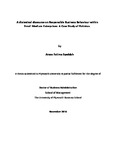A dialectical discourse on Responsible Business Behaviour within Small Medium Enterprises: A Case Study of Pakistan
| dc.contributor.supervisor | Howell, Kerry E | |
| dc.contributor.author | Syeddah, Arzoo Fatima | |
| dc.contributor.other | Plymouth Business School | en_US |
| dc.date.accessioned | 2017-07-07T09:35:54Z | |
| dc.date.issued | 2017 | |
| dc.identifier | 10392109 | en_US |
| dc.identifier.uri | http://hdl.handle.net/10026.1/9598 | |
| dc.description.abstract |
This thesis investigates the dialectical nature of Corporate Social Responsibility (CSR) phenomenon a common buzzword in today’s globalized economy. The emergence of CSR as a significant issue in recent years can be attributed to the expectation in developed countries for business to engage with society beyond their commercial interests. Business are now under sustained pressure to be held publicly accountable for their activities. The research shed light on two research gaps identified within business ethics- idea of business responsibility firstly in the context of the big economic players of tomorrow- emerging markets; and secondly in relation to small and medium enterprises. Adopting a phenomenological approach based on Critical Theory and Hermeneutics framework, the research attempted to uncover the link between business and ethics in relation to SMEs. This led to the construction of a theoretical model –A.R.T Model, aimed at enhancing understanding of how SMEs perceive and practice socially responsible behaviour. Contribution to knowledge was also made in applying Bourdieu’s Theory of Logic of Practice to explain actions of SME owner-managers; and carrying out a comparative analysis of Social Capital theory versus normative Stakeholder Theory to describe workings of SMEs towards their stakeholders. These contributions met the objectives of the study: creation of a ‘native’ model of social responsibility for SMEs in Pakistan (reflective of the local social reality) using a business ethics and cultural construction; and exploring the nature and evolution of CSR in emerging markets. The research also revealed that socially responsible practices by SMEs are inherently informal and voluntary in nature, driven more so by ethical than religious motivations. Furthermore, philosophical synergies were created between the A.R.T model and the normative construct consisting of Classical antiquities - Kant, Adam Smith and Machiavelli, which bridged the gap between theory and CSR driven practice. | en_US |
| dc.language.iso | en | |
| dc.publisher | University of Plymouth | |
| dc.rights | Attribution-NonCommercial-NoDerivs 3.0 United States | * |
| dc.rights.uri | http://creativecommons.org/licenses/by-nc-nd/3.0/us/ | * |
| dc.subject | Corporate Social Responsibility (CSR) | en_US |
| dc.subject | Pakistan | |
| dc.subject | SMEs | |
| dc.subject | Emerging Economies | |
| dc.subject | Dialectics | |
| dc.subject | Hermeneutics | |
| dc.subject | CSR (Corporate Social Responsibility) | |
| dc.subject.classification | Other (e.g., MD, EdD, DBA, DClinPsy) | en_US |
| dc.title | A dialectical discourse on Responsible Business Behaviour within Small Medium Enterprises: A Case Study of Pakistan | en_US |
| dc.type | Thesis | |
| plymouth.version | publishable | en_US |
| dc.identifier.doi | http://dx.doi.org/10.24382/379 | |
| dc.identifier.doi | http://dx.doi.org/10.24382/379 | |
| dc.rights.embargodate | 2018-07-07T09:35:54Z | |
| dc.rights.embargoperiod | 12 months | en_US |
| dc.type.qualification | Doctorate | en_US |
| rioxxterms.version | NA |
Files in this item
This item appears in the following Collection(s)
-
01 Research Theses Main Collection
Research Theses Main



